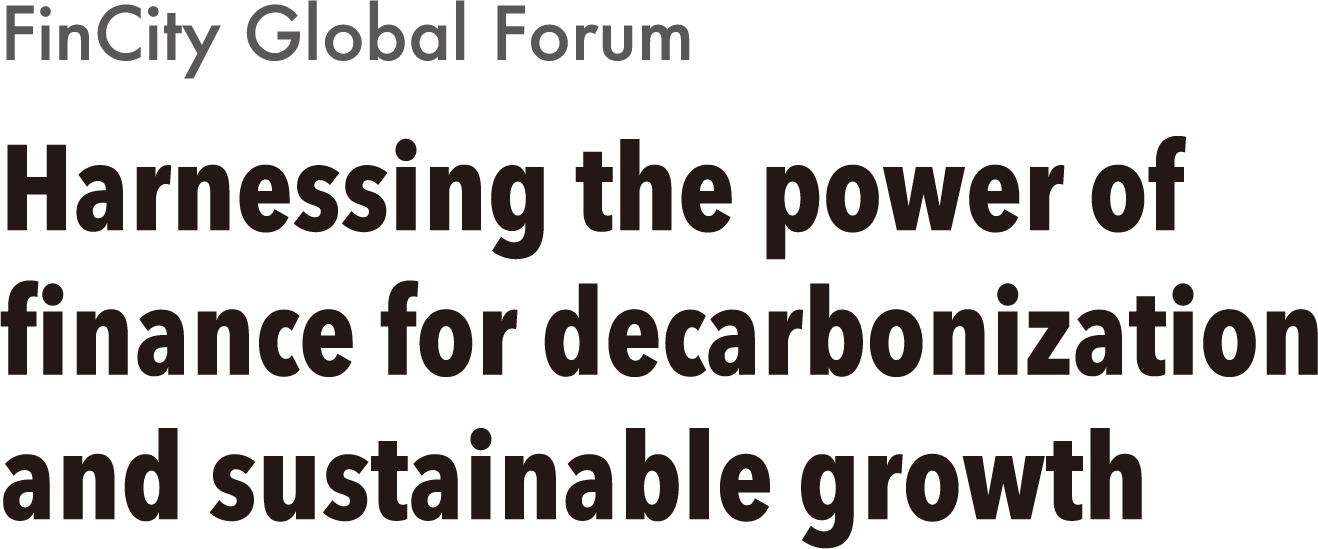Opening Remarks

"Tokyo’s future as a global center of green finance"
Hiroshi Nakaso, Chairman, FinCity.Tokyo
Supporting fundraising by Asian firms
With the aim of achieving carbon neutrality in 2050, the Japanese government's International Financial Center Japan vision has evolved into a vision for a green international financial center intended to harness the power of finance to support decarbonization. In addition, the Tokyo Metropolitan Government announced Global Financial City: Tokyo, Vision 2.0, aiming to support green and digital technologies with a financial approach. The aim of the International Financial Center Japan vision is for Japan to function as a financial center for firms in Japan and across Asia. By performing its own unique roles, Tokyo should be able to contribute to decarbonization and sustainable growth throughout Asia.
Keynote Speech①

"A global financial city to promote sustainable capitalism"
Seiji Kihara, Deputy Chief Cabinet Secretary
Steadily growing transition bond markets
Carbon neutrality is one of the most important topics of the New Form of Capitalism. Already, making use of the two trillion yen ($17 billion) Green Innovation Fund, the Japanese government is taking concrete steps. Last year's “Basic Policy on Economic and Fiscal Management and Reform” specified measures to realize a green international financial center to promote green bond transactions. We will develop transition bond markets through, building a framework to certify the eligibility of bonds and facilitating a clearinghouse platform for issuance information. Stimulation of startups is vital, too, and through formulating a Five Year Startup Creation Plan, we will aim at substantially increase the amount of investment in start-ups through public-private partnerships.
Keynote Speech②

"Expectations for the asset management firms and the FSA’s efforts to enhance the asset management business"
Hitoshi Kikawada, State Minister of Cabinet Office (Financial Services)
Promote the Global Financial City Tokyo vision through the improved capabilities of asset management firms
The Financial Services Agency has engaged in dialogues with asset-management firms to improve their capabilities with respect to their governance framework to prioritize customers’ interests; management structure; well-differentiated visions and competences; and operational structure putting asset management performance first. In addition, we identify issues such as performance versus costs, variations in fees among index funds linked to the same benchmarks, and have discussions with asset-management firms on the concern that some funds labelled as “ESG” might not materially differ from other ordinary funds. We believe that the enhanced investment management capabilities of the firms will lead us to realize the Global Financial City Tokyo vision. The Financial Services Agency continues supporting the proactive efforts by the industry.
Keynote Speech③

"Global Financial City Tokyo and JPX"
Hiromi Yamaji, President & CEO, Tokyo Stock Exchange, Inc./ Director & Representative Executive Officer, Group COO, Japan Exchange Group, Inc.
Stimulating markets and promoting sustainability
The Tokyo Stock Exchange is a highly liquid exchange in which overseas investors account for about 60% of trading. The market segments will be restructured in April to stimulate activity even further. Key targets of the revisions to the Corporate Governance Code in June of last year include enhancing board independence, promoting diversity, enhancing the quality and quantity of climate-related disclosure, and expanding disclosure and provision of information in English. The Exchange's initiatives toward addressing sustainability issues include supporting the sustainability initiatives of listed companies and offering ESG-related products, as well as aiming for carbon neutrality across the whole JPX Group.
Panel Session①
"How can financial services attract highly skilled financial personnel?"
<Speakers>
Hideki Mishima, CEO, SMBC CLOUDSIGN
Gen Uehara, Head of Strategy and Planning, APAC Region, Symphony
Yukiko Ozaki, Senior Managing Director, Nomura Holdings, Group Head of Human Resources/ Senior Managing Director, Nomura Securities, Head of Human Resources Dept. and Human Resources Development Dept.
Eriko Nonaka, Secretary-general, Fintech Association of Japan
Futoshi Itani, Director, Senior Managing Executive Officer, Sumitomo Mitsui Trust Bank, Ltd.
<Moderator>
Takayuki Yanagisawa, Manager, HR Agent Division High Career-Global Consulting Department, Recruit Co., Ltd.
Securing flows of specialized, diverse human resources
Although people tend to see the outlook for the domestic financial industry in negative terms, the banking and securities industries already are making steady progress on reform initiatives intended to break away from this feeling of helplessness, including promoting opportunities for senior human resources and women, adoption of midcareer hiring from other industries, and advanced employee training. In addition, the financial industry's strict approach to risk management and the solid customer base also have great potential for future progress. Fluid flows of diverse human resources with specialized knowledge and skills between financial institutions and fintech and other startups will also power the further evolution of finance. It is vital for the industry to work together to lay the foundations for such progress.

Panel Session②
"Art and culture: Ingredients for a financial center?"
<Speakers>
Fumiyuki Takeda, Noh actor
Masayori Shoji, Partner, Fintech Innovation, KPMG Consulting Co., Ltd./ Founder, Japan Alternative Data Accelerator Association
Tomonao Hara, Jazz trumpet player/ Composer/ Bandleader/ Professor, Chair at Senzoku College of Music
<Moderator>
Tomomi Suzuki, Newscaster
Inspiring artistic innovation
Arts and culture thrive in international financial centers, in each of which innovation and urban growth are driven by concentrations of and interaction among diverse talents from across various fields. One of Japan's strengths is its full range of diverse arts and culture, from the traditional art forms of Noh to those of jazz, that fuse multiple cultural elements. In addition, in Japan, management philosophies are being reconsidered from new perspectives, such as purpose, and there is growing interest in approaches such as artistic thinking, as well as the possibilities of arts and culture. Promotion of the Global Financial City vision can be expected to accelerate deployment of Japan's arts and culture, both domestically and internationally.
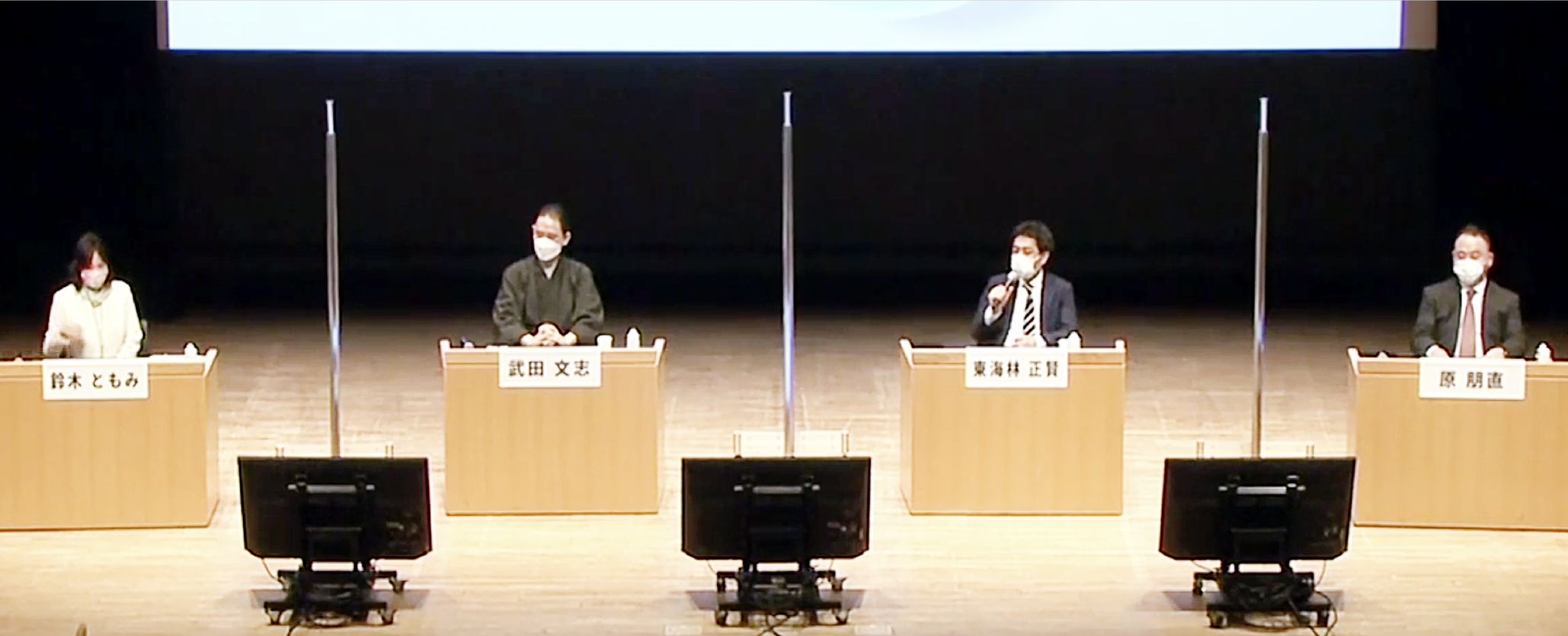
Panel Session③
"Promotion of green finance for the realization of a carbon-free society"
<Speakers>
Kazuhiro Nishimura, Operating Officer, Tokyu Fudosan Holdings Corporation/ Operating Officer, TOKYU LAND CORPORATION
Atsuhito Mori, Head of Sustainable Investment, Japan, FTSE Russell
Takanobu Suehiro, General Manager of Wholesale Banking Unit/ Sustainable Business Promotion Dept., Sumitomo Mitsui Banking Corporation
Akiko Osawa, Director and Executive Officer Chief Investment Officer, Nippon Life Insurance Company
<Moderator>
Ryushiro Kodaira, Editorial Writer/ Senior staff writer, Nikkei inc.
Supporting funding demand toward a net zero society
Capital investment and technological development over the coming decade will be vital to the achievement of a net zero society in 2050, and there is expected to be demand for funds in the trillions of yen for this purpose. Increasing numbers of companies are striving toward decarbonization by proactively utilizing ESG finance, and sustainable finance is experiencing considerable growth. To increase efficacy, it is vital to enhance engagement between institutional investors and investments. It is essential that companies not only raise the funds they need but also provide feedback to investors on whether their investments are performing their roles properly. In advancing the vision of Tokyo as a green global financial center, there are needs to clarify the definitions of "green" and "transition," to support earning of independent certification, and for proactive disclosure.
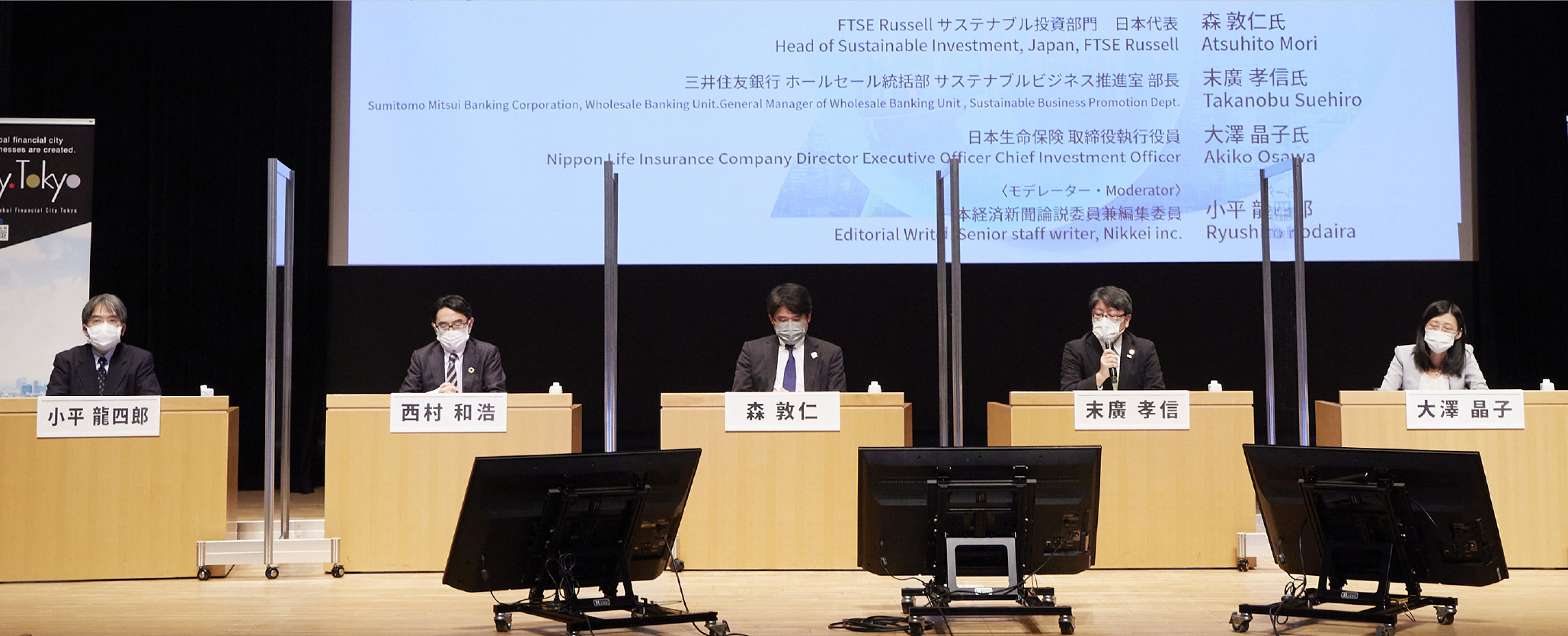
Panel Session④
"Strengthening SMEs through the sophistication of supply chain finance"
<Speakers>
Tadahiko Kozaki, Director of Finance Division, Business Environment Department, Small and Medium Enterprise Agency
Mamoru Fujimoto, Executive Officer, Head of Blockchain promotion, SBI Holdings Inc./ Representative Director & CEO, SBI R3 Japan Co., Ltd.
Akira Ieda, Chairman of the Board, Money Forward Kessai, Inc.
<Moderator>
Jun Tamaki, Editor Nikkei.Inc
Public-private partnerships in areas such as shared EDI
In light of the policy calling for abolition in 2026 of the traditional settlement method of notes, which has involved numerous issues on the draft and recipient sides, the aim is to digitize all processes from receipt and placement of orders through settlement by promoting shared electronic data interchange (EDI) for SMEs. At the same time, some SMEs are unable to secure bank loans, and products are being introduced to enable fund raising through sale of accounts receivable to factoring firms (online factoring), to make supply chains visible using block-chain technology, and to support flows of funds to the level of end suppliers, using the credit of the companies ordering supplies. Public-private partnerships toward supply-chain digitization are essential for the purpose of enabling SMEs to enjoy the benefits of digital technologies as well.
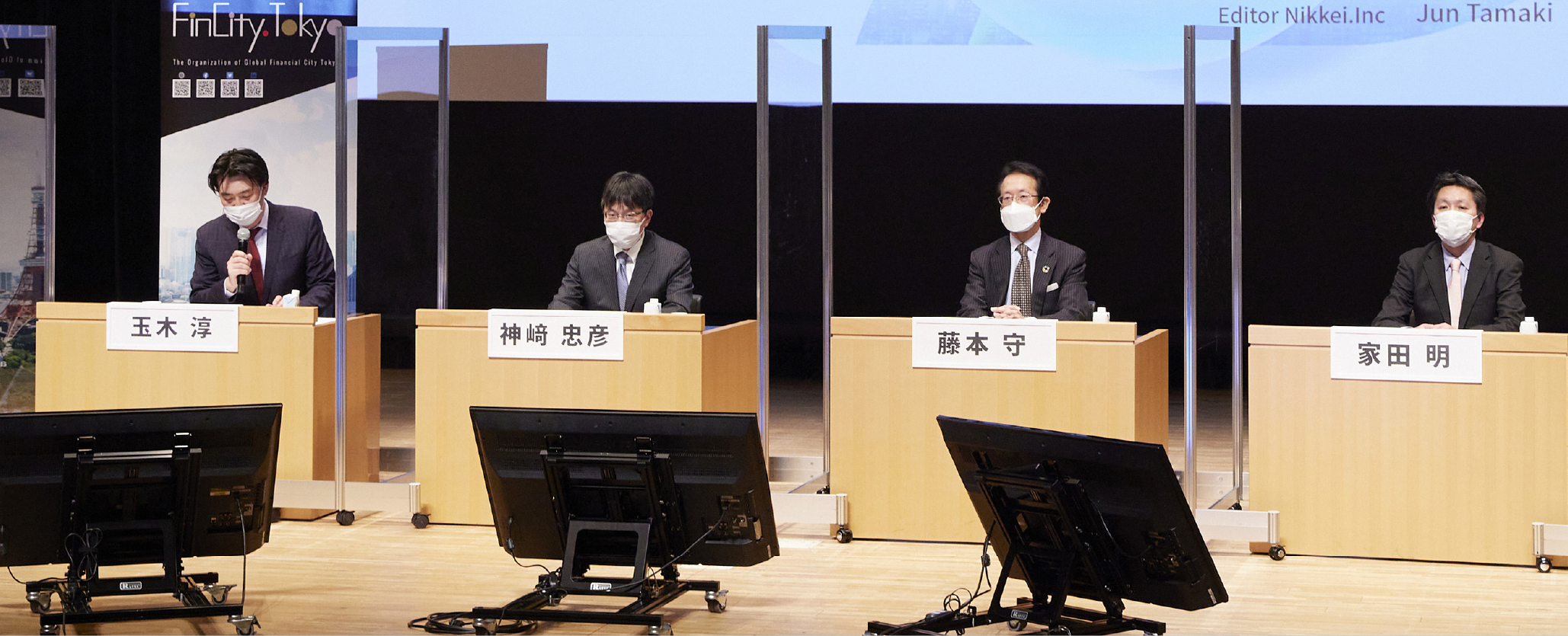
Panel Session⑤
"Discussion with FinCity.Tokyo ambassadors :
Tokyo’s future as a global financial center"
Discussion by 4 FCT Ambassadors
<Speakers>
Yuko Kawai, CEO, Japan Digital Design Inc.
Laurent Depus, Member of the Board, SMBC TRUST BANK
Jesper Koll, Senior Global Advisor, Japan Catalyst, Inc.
David Semaya, Executive Chairman and Representative Director of SUMITOMO MITSUI TRUST ASSET MANAGEMENT Co., Ltd.
<Moderator>
Gary Stanton, Secretary General, International Bankers Association of Japan (IBA)
An excellent opportunity for green finance
While there have been visions for Tokyo as a global financial city in the past, this new vision reflects the commitment from the political side as well. Market investment of roughly 2,000 trillion yen in dormant individual financial assets will lead to excellent opportunities for investment firms, and Tokyo welcomes the participation of investment firms from overseas with their own unique investment instruments. Other strengths of Tokyo include Japan's strong industrial infrastructure and its close ties to the growth engine of Asia. Tokyo can contribute to decarbonization in Asia by supplementing, rather than competing with, other financial centers in the region. Japan's legal and regulatory systems should also help to build highly reliable green finance markets while preventing greenwashing.
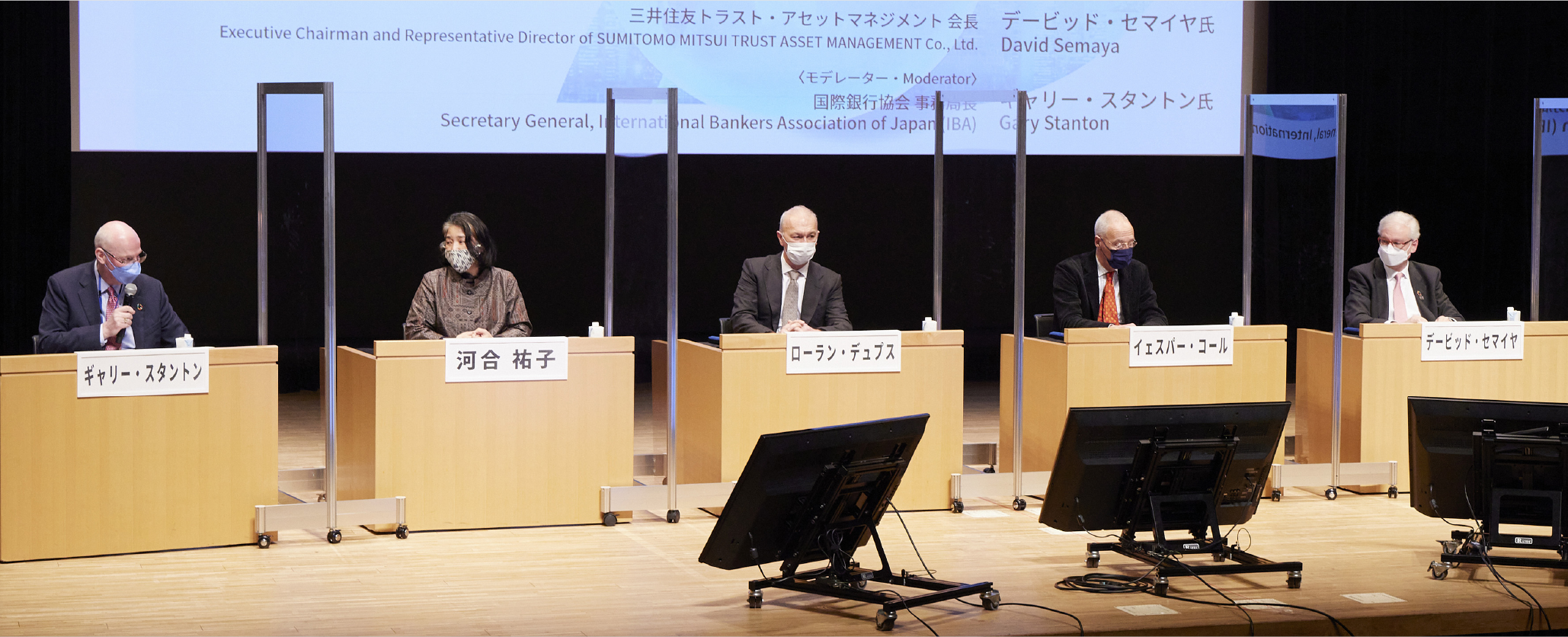
Panel Session⑥
"Post-COVID-19 collaboration among global financial centers"
<Speakers>
Nicolas Mackel, CEO of Luxembourg for Finance, the Agency for the Development of the Financial Centre
Philippe Richard, Executive Director, International Affairs Financial Services Regulatory Authority of Abu Dhabi Global Market
Arnaud de Bresson, CEO, Paris EUROPLACE
Keiichi Aritomo, Executive Director of FinCity.Tokyo
<Moderator>
Jochen Biedermann, Managing Director, World Alliance of International Financial Centers (WAIFC)
Collaboration is essential even as international financial centers compete with each other
FinCity.Tokyo is a member of the World Alliance of International Financial Centers (WAIFC). Participants in this session included the persons responsible for the promotion organizations of other WAIFC-member financial centers — Paris, Luxembourg and Abu Dhabi — and the WAIFC general secretary. The WAIFC's activities include joint research, surveys and case studies to help realize solutions to various social issues in each country. It also promotes mutual collaboration in communication of information to increase interoperability of the financial ecosystems of different countries. There will be a need in the post-COVID-19 world for functional enhancements to advance funding cycles to promote adoption of green and digital technologies through further collaboration among financial centers.

From lower left: Philippe Richard, Arnaud de Bresson
Closing Remarks

Yuriko Koike, Governor of Tokyo
A Global Financial City based on three pillars
The Tokyo Metropolitan Government is deploying policies aimed at overcoming the COVID-19 pandemic based on the perspectives of a sustainable recovery with the aim of sustainable growth. In November of last year, it formulated the "Global Financial City: Tokyo" Vision 2.0, targeting decarbonization, adaptation to digital technologies and other aims. The three pillars of these initiatives can be expressed by the words “green,” “digital” and “players.” The aims include promoting the Tokyo Green Finance Initiative (TGFI), supporting the development of fintech firms and a cashless economy and bringing together diverse resources that include asset managers and highly-skilled financial professionals. Tokyo will promote such initiatives effectively, both in Japan and worldwide, together with FinCity.Tokyo.
